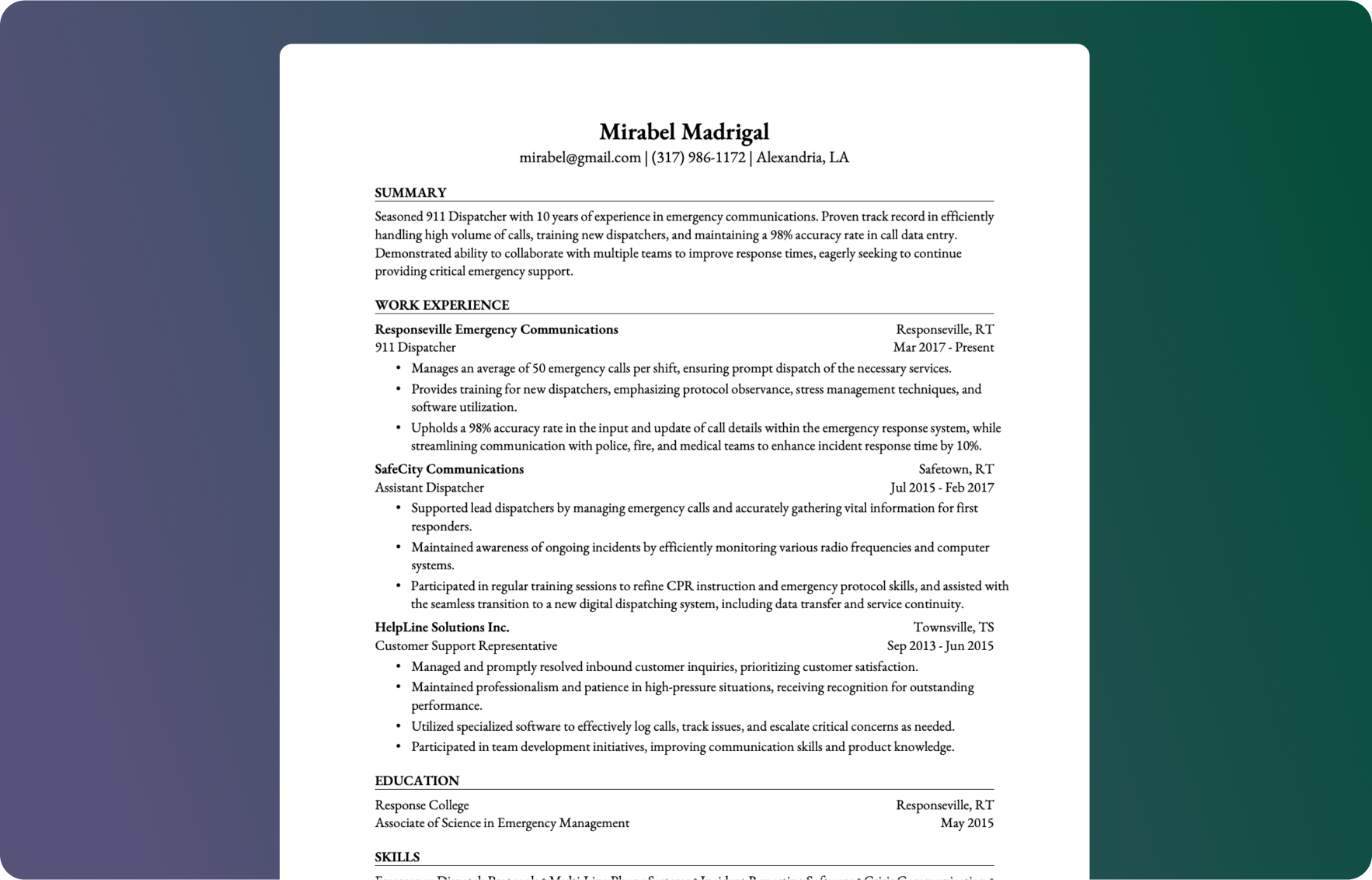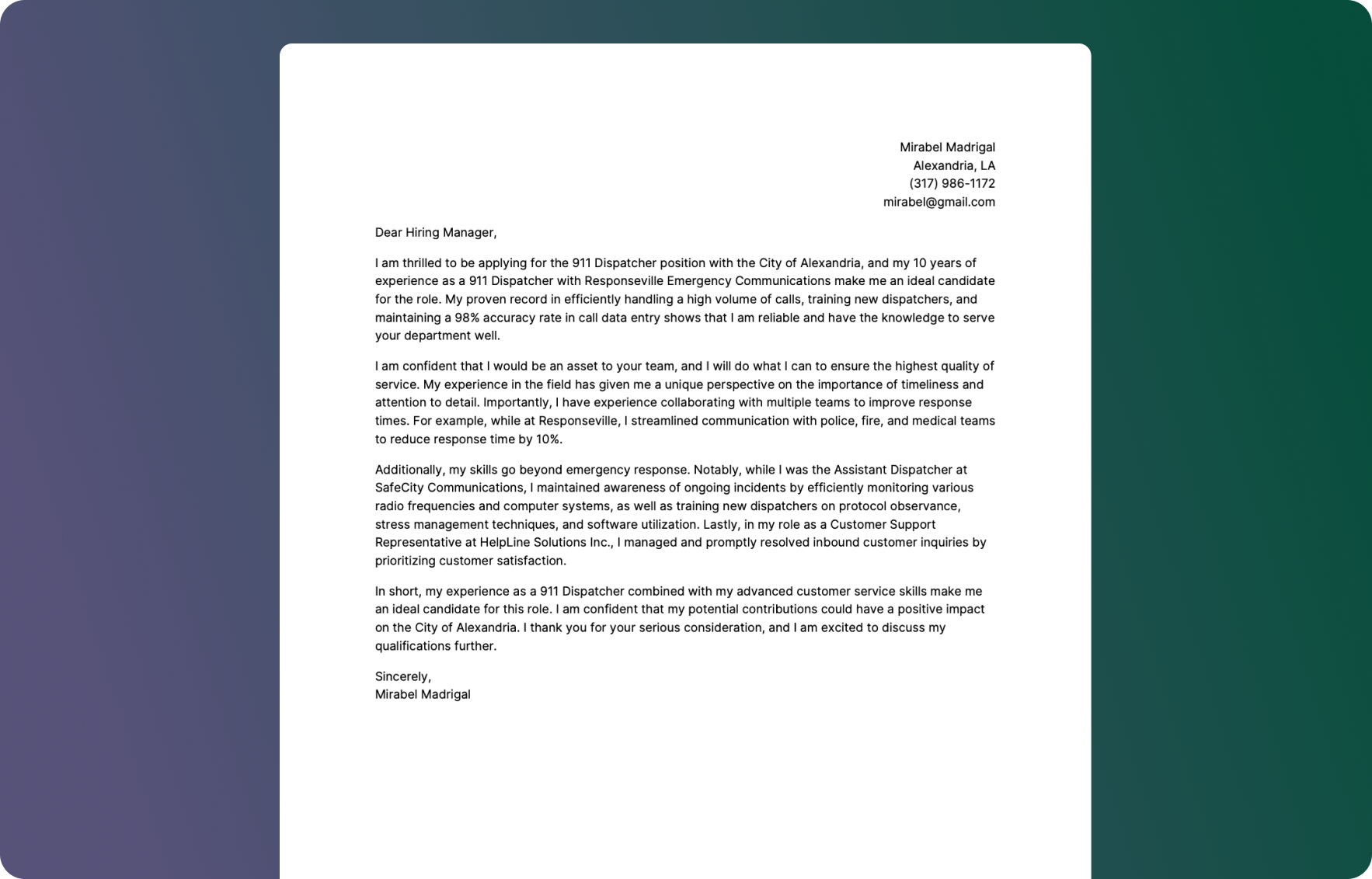Brief overview of the 911 Dispatcher position.
A 911 Dispatcher, also known as an emergency dispatcher or telecommunications operator, plays a crucial role in emergency response systems. Positioned at the frontline of emergency services, they receive emergency calls from individuals in distress, gather vital information about the nature and location of the incident, and promptly dispatch the appropriate emergency responders, whether police, fire, or medical teams. Their role requires them to stay calm under pressure, make swift decisions, and provide potentially life-saving instructions to callers while help is en route. 911 Dispatchers must communicate effectively, manage multiple tasks simultaneously, and often operate complex computer and communication systems. Due to the intense nature of the job, dispatchers undergo specialized training to ensure they can handle a wide range of emergency situations and provide essential support to both the public and emergency response teams.
What are the skills and attributes that companies are looking for in 911 Dispatchers?
- When hiring 911 Dispatchers, employers prioritize a combination of technical, interpersonal, and decision-making skills due to the critical and sensitive nature of the job. Here are the top 12 skills and attributes sought in 911 Dispatchers:
- Composure Under Pressure: The ability to remain calm and think clearly in high-stress situations is paramount for a 911 dispatcher.
- Effective Communication: Dispatchers must be able to quickly obtain relevant information from callers, relay instructions, and communicate effectively with emergency responders.
- Active Listening: Understanding the details of a situation and distinguishing between crucial and non-essential information is vital.
- Multitasking: Familiarity with Customer Dispatchers often handle multiple calls, monitor several screens, and use various communication channels simultaneously.
- Quick Decision-Making: Rapid and informed decisions about the appropriate response team or resources to dispatch can be a matter of life or death.
- Empathy and Compassion: Being sensitive to callers in distress and providing reassurance can be essential, especially in situations where immediate action by the caller is needed.
- Attention to Detail: Accurately logging information, recognizing discrepancies in data, and following procedures without overlooking details is crucial.
- Technical Proficiency: Familiarity with computer-aided dispatch systems, mapping tools, and communication equipment is required.
- Problem-Solving: In situations where standard protocols might not apply, dispatchers need the ability to quickly devise solutions.
- Memory Recall: Remembering protocols, codes, geography, and often-used procedures without always referring to manuals is beneficial.
- Team Collaboration: Working seamlessly with colleagues, sharing information, and coordinating efforts is key, especially during large-scale emergencies.
- Stress Management: The emotional toll of handling emergencies means dispatchers must have effective strategies for managing and mitigating stress.
Example 911 Dispatcher Resume
💡 Protip: EarnBetter has a free tool that can create a professional 911 Dispatcher resume for you. It‘s free and it takes less than a minute to do - click here to get started today!
What keywords are most important to include in your application for a 911 Dispatcher position?
- When applying for a 911 Dispatcher position, it’s crucial to use keywords that reflect the specific skills and attributes essential for the role. Here are 12 important keywords to consider including in your application and resume:
- Emergency Response
- Critical Decision-Making
- Active Listening
- Multitasking
- Computer-Aided Dispatch (CAD) Systems
- Crisis Communication
- Geographical Knowledge
- Data Entry Accuracy
- Team Collaboration
- Stress Management
- Problem-Solving
- Public Safety Protocols
Example 911 Dispatcher Cover Letter
💡 Protip: EarnBetter has a free tool that uses AI to customize cover letters for specific jobs. You can get a professional cover letter tailored to a 911 Dispatcher role in less than a minute - click here to get started today!
What types of questions could I expect for a 911 Dispatcher interview?
Interviews for a 911 Dispatcher role often center around evaluating the candidate’s ability to handle stressful situations, communicate effectively, and make sound decisions quickly. Here are five potential questions, along with guidance and sample answers:
- Question: Describe a time when you had to remain calm under extreme pressure. How did you handle the situation?
- Guidance: Interviewers want to assess your ability to stay composed during high-stress situations. Use the STAR method (Situation, Task, Action, Result) to provide a structured response.
- Sample Answer: "At my previous job at a call center, I once received a call from a person who was having a medical emergency. While it wasn’t a 911 center, I knew I had to act quickly. I calmly gathered necessary information, instructed a colleague to call 911, and stayed on the line with the individual, reassuring them help was on the way. The person later thanked our team for our swift response."
- Question: How do you prioritize tasks in a multitasking environment?
- Guidance: This question evaluates your ability to manage multiple tasks simultaneously, a crucial skill for dispatchers.
- Sample Answer: "In a multitasking environment, I first prioritize tasks based on urgency and impact. For a 911 Dispatcher, the immediate priority is always the safety of the caller and responders. While taking a call, I’d ensure that I’m entering data accurately into the system and dispatching appropriate services as quickly as possible, all while maintaining clear communication with the caller."
- Question: How would you handle a situation where you’re unsure about the right protocol or action to take?
- Guidance: The answer should highlight your problem-solving skills and ability to use available resources.
- Sample Answer: "If I’m ever unsure about the right protocol, I’d quickly refer to available reference materials or guides. If time permits, I would also seek advice from a supervisor or more experienced colleague. Ensuring the safety of the caller and accuracy of the response is paramount, so I would take swift yet informed actions."
- Question: How do you handle the emotional stress that comes with this job, especially after a particularly distressing call?
- Guidance: Your answer should convey resilience and effective stress-management techniques.
- Sample Answer: "I understand the emotional toll this job can have. After a distressing call, I’d take a moment to breathe and center myself. I find that discussing challenging calls with colleagues or supervisors can also be therapeutic, as they understand the unique stresses of the job. Outside of work, I practice mindfulness and engage in activities that help me relax and disconnect."
- Question: Describe a situation where you had to deal with an irate or uncooperative individual. How did you handle it?
- Guidance: This question assesses your interpersonal skills and patience in challenging scenarios.
- Sample Answer: "In my previous role at a customer service center, I once dealt with an irate customer who was upset about a billing error. I listened patiently, letting them vent, before calmly explaining the situation and outlining the steps to resolve it. It’s essential to remain calm, empathetic, and focused on finding a solution."
What is the average day in the life of a 911 Dispatcher?
A 911 Dispatcher’s day revolves around handling emergency calls and coordinating rapid responses to various crises. Their shift typically begins by logging into the Computer-Aided Dispatch (CAD) system and checking equipment to ensure everything is functioning correctly. Throughout their shift, dispatchers wear headsets to field incoming calls, simultaneously answering callers while entering critical information into the CAD system. Each call demands active listening to extract vital details, quick decision-making to determine the necessary emergency services, and clear communication to dispatch the appropriate units, be it police, fire, or medical teams. In addition to managing live emergencies, dispatchers often liaise with officers in the field, update call logs, and monitor multiple screens and radio channels. Given the unpredictable nature of emergencies, their day can fluctuate between intense, high-pressure situations and quieter moments. Periodically, dispatchers might participate in team briefings or training sessions to stay updated on protocols. Throughout, they must maintain focus, composure, and readiness, knowing that the next call could be a life-or-death situation.
What if I want to become a 911 Dispatcher but I don’t have much experience?
If you aspire to become a 911 Dispatcher but lack direct experience, it’s essential to focus on transferable skills and relevant training. Begin by seeking courses or certifications in emergency dispatch or crisis communication. These will not only provide foundational knowledge but also demonstrate your commitment to potential employers. Next, emphasize any past roles or experiences where you’ve had to manage high-stress situations, multitask, or communicate effectively under pressure, as these are core competencies for dispatchers. Volunteering for community emergency response teams or local crisis helplines can offer hands-on exposure and valuable networking opportunities. Finally, consider starting in a lower-tier position within an emergency response or call center environment to gain familiarity with the systems and protocols. With dedication, ongoing learning, and a focus on building relevant skills, you can position yourself as a viable candidate for dispatcher roles, even without direct experience.

